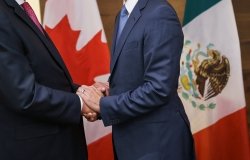Fellow Researches Political Economy of North African Nations
Stephen King, a 2002-2003 Wilson Center Fellow looks at the connection between economic reform and political change in North Africa and the Middle East.
Wilson Center Fellow Stephen King has long held an interest in the politics of sub-Saharan Africa. But following a three-year Peace Corps. assignment in Morocco, that interest expanded to include North Africa, a region that remains a major focus of his research today.
In June, the Wilson Center launched King's new book, Liberalization Against Democracy: The Local Politics of Economic Reform in Tunisia, [Indiana University Press, spring 2003]. In this book, King takes a look at Tunisia's countryside, and postulates that economic liberalism has heightened traditional clientelism and, instead of promoting democracy, has subverted democratic tendencies.
King, an assistant professor of government at Georgetown University, just finished his nine-month fellowship at the Wilson Center, where he was conducting follow-up research to this latest book. His new research analyzes the links between economic reform and political change in Egypt, Syria, Tunisia, and Algeria. He contends that new forms of authoritarian politics have emerged in these countries, characterized by state-imposed market reforms sharply biased toward economic elites, restricted political rights, and corruption.
The four countries in King's study, to date, contradict the general trend that democracy follows economic liberalization. In these cases, explained King, the state- establishing a new social base under market reform-becomes more repressive and corrupt. In each of these countries, he said, there is an all-powerful president and a weakened parliament. A new group of economic elites is gaining land and assets" said King, "and they don't want these privileges open for debate."
King said that, economically, of the four countries in his study, Tunisia is faring the best, partly because its private sector was not destroyed during the socialist period. Egypt and Syria both have had a weak private sector under socialism, but today both are moving toward a private enterprise economy, said King. Algeria had attempted simultaneous economic and political liberalization and ended up in civil war. But natural resources in Algeria-specifically oil and natural gas-can at times make economic reforms less urgent.
"My approach is to look to the larger political and economic factors that have an impact on economic and political change," said King, "with a particular focus on changes in the balance of class power." He cited such reasons as the ongoing economic crisis, the globalization of capital production, changing resources available to different groups, and a crisis of regime legitimacy, as contributions to the establishment of a new post-populist authoritarianism in Egypt, Syria, Tunisia, and Algeria.
He said, "This authoritarianism partially addresses the countries' need for economic reform but is not ideal in terms of economic efficiency and certainly not in terms of the prospects for democracy in the region."










